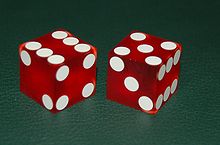This article needs additional citations for verification .(July 2018) |

The following is a glossary of terms used in the dice game craps . Besides the terms listed here, there are many common and uncommon craps slang terms. [1] [2]
This article needs additional citations for verification .(July 2018) |

The following is a glossary of terms used in the dice game craps . Besides the terms listed here, there are many common and uncommon craps slang terms. [1] [2]
{{cite journal}}: CS1 maint: DOI inactive as of March 2025 (link)